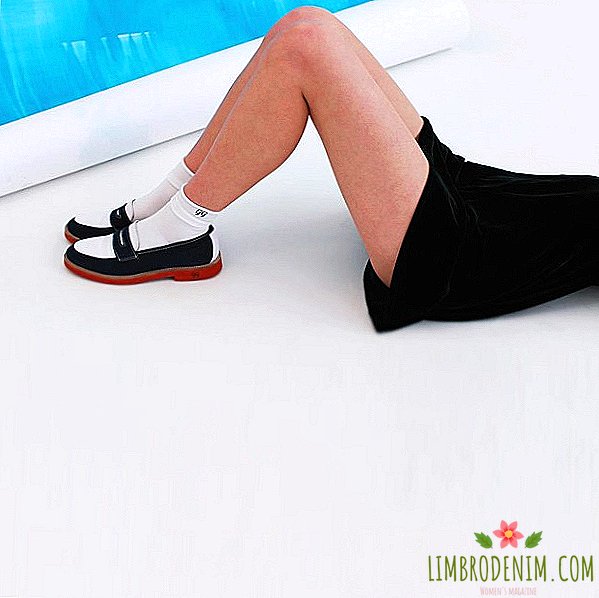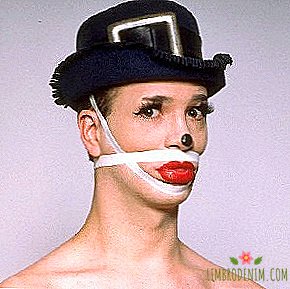"I can not stand the word on the letter" to "": How little people live
Those who have not heard with classmates all the lessons of Russian literature, the phrase "little man" will most likely remind you of Gogol's "Overcoat" - but in the 21st century this term means something completely different. “Little People” is a tracing from English “little people”, a politically correct notation for all people with dwarfism (according to the Little People of America association, their height is usually from 81 to 142 centimeters). Atypical growth and body proportions are not the result of a single disease: doctors associate dwarfism with two hundred diagnoses, each of which has its own characteristics. Among them are both inherited diseases and random genetic mutations, as well as hormonal and metabolic disorders - with one form or another of dwarfism are born from one in 15 thousand to one in 40 thousand babies.
We tried to figure out how small people in Russia and abroad live and what problems they face - and also talked with two Muscovites about their activities, attitude and plans for the future.

"Invisible" discrimination
Most small people consider the word “dwarf” insulting - and they are easy to understand: this term (in English - “midget”) is strongly associated with shameful episodes from ancient and recent history. Miniature slaves who were highly valued in ancient Rome, people whom the monarchs of the Renaissance gave to each other as an exotic toy, court jesters, exhibits from "collections of wonders" and captives of "human zoos" of the XIX century - an atypical physique systematically became an occasion for humiliation, and sometimes cost little people their lives. In the era of bodipositive, freak shows seem unimaginable archaic, and the slave trade has been banned for a couple of centuries, but their echoes still occur - in China, for example, there is a theme park called the Kingdom of Little People, where about a hundred people live and entertain with dwarfism, there is a "dwarf bullfight" in Mexico, and in progressive countries like Australia, France and the USA they are still trying to challenge the ban on throwing small people (remember the scene from "The Wolf of Wall Street"?).
Today, people with dwarfism are rare, but still face direct restrictions - for example, in Russia they cannot drive buses and trucks, although no statistics confirming the link between growth and driving skills do not exist. Even if a small person does not dream of a career as a chauffeur and does not like to ride a roller coaster, he may experience exotism and fetishization of dwarfism, which is rooted in culture - for example, a stereotype about the propensity to violence or suspicion of childishness. They are most likely related to the fact that in mythology people of unusually small stature often personified “primitive instincts” and “unbridled forces of nature”. Apparently, there was a stereotype about low intelligence from there, which has nothing to do with reality: dwarfism has nothing to do with intellectual development and mental health. Most people with dwarfism have a disability, but it is assigned not because of small stature, but because of congenital or acquired diseases, mostly orthopedic.
From freak shows to Golden Globes
Small ones often face an oversupply of strangers. An American, Kara Reedy, in a column for CNN, notes that every day she feels like the "highlight of the program at the circus": "When I go to buy groceries, when I buy tampons at the pharmacy, it's like I'm a celebrity, and all other people are paparazzi." Perhaps because of this exaggerated curiosity, small people are more represented in pop culture than other people with special characteristics — and this seems to be good, but their line is most often limited to a set of cartoon or fantastic characters.
The most famous roles of actor and stuntman Verne Troyer, one of the most successful little people in Hollywood, are Mini-We, a clone of Dr. Evil from the Austin Powers series, and the goblin Crookwatch from Harry Potter, and he started his film career with him comedy "Baby on a walk", where he was a double of a nine month old child. The "serious" dramatic roles of small actors can be counted on the fingers - the first to come to mind is Peter Dinklage, who received Golden Globe for his role as Tirion Lannister in Game of Thrones. There are no obvious superstars with dwarfism in the Soviet and Russian cinema, but we can recall Viktor Beshlyagu, who played Albert’s criminal authority in the film “Assa”, and Vladimir Fedorov, a famous nuclear physicist and actor, who became famous as Black Seahorn in the film adaptation of “Ruslan and Lyudmila”.
Hollywood actor Billy Barty in 1957 founded the organization Little People of America, which represents the interests of young people in the United States, including advocating for their adequate portrayal in pop culture and media. Now there are a dozen shows that talk about the lives of little people with humor and without humiliating indulgence: the series "Little People, Big World" on TLC, the reality "Little Chocolatiers" about the family confectionery business, "The Little Couple" about a couple trying to have a baby, "Little Women: NY" about the company of small women who work and hang out in New York. And for those who are still too early to watch reality, there are books — for example, Liza Graff’s novel Something about Georgie. His main character is a boy with dwarfism, but in general a book is not about that at all.


Ilizarov's device and the button in the elevator
Most diagnoses related to dwarfism, including the most common — achondroplasia — have genetic reasons that cannot be influenced after the birth of a child. One of the difficult questions, in which there is no consensus among Russian or Western experts, is surgery to lengthen the limbs. They are relevant for those forms of dwarfism, which scientists conventionally call disproportionate: they are characterized by "average" body and head sizes, and legs and arms are noticeably shorter than those of a man of average height. Limb lengthening operations are most often carried out according to a technique developed by the Soviet orthopedic surgeon Ilizarov in the 1950s with the help of the famous apparatus consisting of metal rings and knitting needles inserted into the bones. This is painful (because the bones are broken before distraction) and long: the process together with rehabilitation takes at least a year, and for a good result, the procedure is recommended to be carried out in childhood when the tissues are more elastic.
Many activists and parents of children with achondroplasia are opposed to operations, believing that physical and psychological trauma should not be inflicted on a child in order to make his growth “socially acceptable”. Journalist Dan Kennedy, the author of an incredibly touching book about little people dedicated to her daughter, urges "not to try to repair people who are not broken."
In Russia, where operations to lengthen the limbs are a common practice, there are also their opponents - among them the founder of the group Little Big, actress and model Anna Castellanos. She notes that growth hormones are often bought and taken uncontrollably, and operations using the Ilizarov technique can lead to problems with the joints, the muscles of the foot and other complications. “With the device, children spend five years in the hospital,” says Castellanos. “And after that, normal childhood — swimming, cycling — is out of the question. And for the difference, they extend ten centimeters. Instead of instilling a child, that he is the best, that he can do anything. Children need support from birth, not cosmetic improvement. "
In Russia, the Kurgan Research Institute of Experimental and Clinical Orthopedics and Traumatology (KNIIEKOT) named after Ilizarov himself is considered to be the main institution that performs operations on lengthening of the extremities. Judging by the numerous groups in social networks, the former patients of the center treat their stay in the hospital with their peers roughly as a change in the children's sanatorium: in communities like "Life after meeting Ilizarov ..." they spread nostalgic videos, discussing who in ten wards lay years ago, and looking for "graduates".
Many people who have undergone surgery claim that this has drastically changed their lives: sometimes, just a few centimeters can decide whether a person will reach the button in the elevator or buy clothes in the adult section. People of small stature face many everyday problems to which they can adapt, but it still takes away their strength - it is easy to understand those who want to quietly withdraw money from an ATM, see themselves in the bathroom mirror or place an order because of the bar counter. Of course, it would be more correct to make bar counters, bathrooms and ATMs that are comfortable for everyone than to carry out painful operations for thousands of children - however, this is not a question for small people.

I am now studying at the fourth year of the Veterinary Academy, at the same time I am interning at the clinic. We have some guys from the second year go to work, and I put it off for a long time, because I was afraid that something would not work out. It turned out that she was afraid in vain - I cope with everything. Now I will finish the courses of the veterinary neurologist, I think that I will stay in the same clinic where I am now on probation. I dreamed about this profession since childhood, it is really cool, and veterinarians have no problems with employment.
People react differently. There are "brave men" who ask a lot of questions - I don’t hesitate and the questions are usually open. The reaction of children is always funny: they used to say "look what a little girl with an adult face", and now they even call it "little mommy." Old age is no joy.
I have the 31st leg size, so I buy shoes for the nursery, there is not enough variety - naturally, no one does for little girls shoes with ten-centimeter heels. Theoretically, this problem can be solved by making custom-made shoes, but it is still expensive. The essence of our disease, achondroplasia, is in a disproportionate growth of the limbs, so clothes have to be improved: you buy pants, cut leg pants - it sits normally, you buy a jacket - you cut sleeve, everything is normal. And with t-shirts and shorts in general there are no problems. Generally, to be honest, everything is super, I don’t even know what to complain about.

Our disease is not treated: there are no drugs, no special instructions - just such a small person is there. The only thing that can be done is plastic surgery with the help of Ilizarov apparatus. I went to the hospital when I was in the eighth grade, and for two years I went with this apparatus. Growth I have increased by fifteen centimeters, this is a cool result. I do not perceive this as some kind of difficult period in my life, my hospital associates with new friends and new impressions.
Yes, it hurt, yes, it was hard, but it was worth it. If it were not for this, I would be 117 centimeters, not 140, as now. 117 is not a gate at all. I could not safely use the elevator, intercom, well, how can you live. But of course, the man himself must decide. I remember a little girl in the hospital with me, she was about eight years old, and for her it was a terrible stress. I do not remember exactly how I was offered a surgery: once, and we went to discuss everything with the doctors. But no one really forced me.
I'm alone in the family so small - a genetic failure. A lot depends on how parents behave, how they perceive you. My relatives never said that something was wrong - I don’t even remember when I realized that I was different from my peers. When they start treating you as a person with peculiarities, it is unpleasant: I have a friend who, in order to talk to me, begins to stoop, and at such moments I think: “Again, what is this! No, I don’t need , you are welcome!"
There are several communities of small people in social networks. For example, I know the group “Meter with a cap” on the VKontakte network, as if Anna Caste had organized it. She actively advocated to get together, hang out together, but then I was too small to go somewhere. In general, I do not really understand why this is necessary. Sharing experience - how? Maybe in America small people can get together and nobody will look at them sideways, but with us it will be ... well, it will cause unnecessary attention. I am not in favor of small people hanging out and meeting only with each other. I don't get acquainted with the little guys, I don't take them - I have such a glitch. First, it is a hereditary disease with a 50 percent chance of being transmitted to children - what's the point of doing this? I want healthy children. Of course, small people find it harder to find a partner. We have such a mentality: they will show a finger, they can approve, or they may not approve, not every parent will react with understanding. This also applies to people with the “wrong” orientation, the “wrong” skin color.
We all have a disability - not because of growth, of course, but because of a disease. This is not bad - it gives extra money, free parking. I drive a car, and I feel comfortable without any adaptations. Before I went to get the rights, we considered different options: you can increase the pedals, use some kind of auxiliary mechanisms, but it never worked for me.
The dude from Game of Thrones, played by Peter Dinklage, almost everyone's favorite hero, is pleasant. There is also St. Petersburg group Little Big, there was just Anna Kast, now Olympia Ivleva remains. She also inspires me, cool character. I think that small people should be more in media and cinema - so that they treat us more lightly, not like something unusual. In general, I respect more professions in which you achieve everything with brains and hands, and not appearance: it’s not for nothing that models stop working early, and a doctor’s career is a long time.

My family is one mother, she, of course, wants only good things for me, but she believes that she must get a higher education. I will enter the theater institute here in Moscow, but I have to prepare very well. So while I get experience on the set and go through different courses.
There are a lot of offers for small people - there are a lot of actors, we constantly go to castings, we have strong competition. I have an unusual appearance, I’m a pumped up dwarf, so I often don’t join the types that are needed for shooting. Of course, we usually play small people - they take me to be either handsome, or mafia, or gopnik. Basically, of course, every trash. Immediately offered to play in porn - we all are immediately offered, the usual thing. Everyone has different tastes, but I try to stay away from it.
I do not mind the word "dwarf" - this is true. Many people do not want to humiliate, and are friendly. I know that it offends others, but I'm fine.

Previously, of course, growth was strongly hampered in communicating with girls - especially at school, and before that in the kindergarten, they were sometimes offended, teased. I think it hardened my character. Now girls often pay attention to me, but there is no serious relationship, everything is friendly. In general, girls often come up to me, I don’t know, maybe their motherly instinct wakes up when they see me.
I think that most of the problems of small people are from self-doubt: since childhood you are told that you are not such that something is impossible for you. I did the opposite, because I was fond of sports as a child. I was engaged in wrestling and can give change, but in general I do not like to fight. Fists waving difficult, no swing. But on the other hand, I weigh 60 kilograms with a height of 138 centimeters - and the opponents are mostly slimmer and taller, because of my build it is difficult for them to lay me down. I press the barbell 130 kilograms, difficult, but it turns out.
I show shows in clubs - I pose, I show the body, I tell jokes. We humor a lot - in our image it looks organic. Well, dancing, of course, clowning, circus - it is believed that if the dwarfs, then the circus immediately somewhere nearby. I try not to stop, to acquire new skills, to invent something - there are even thoughts to write a book. About the man of the future, who lives regardless of appearance, height, the main thing is what is inside him.
In childhood, I was taken for tests, but they were not specifically treated, the maximum was given by vitamins. We all have a disability, now I have a third group. Offered operations, lengthen the legs of the apparatus, but it is risky, it is not clear what will happen, and I refused.
Of course, there are some difficulties - when you need to get something from above, the car is uncomfortable to drive. It's good that I was born at a time when you can only control the buttons on the steering wheel. It is difficult to pick up clothes: the nursery does not fit me, because the shoulders are wide, so I buy big and shorten it. With shoes, too strange - the leg is wide, I wear the 41st size, and it looks disproportionate.
At first I was engaged in wrestling, I already had a rather muscular body, I thought that it was necessary to use it somehow, for example in the modeling business. Slowly, there are proposals, but so far there have been no major projects. I work with the agency plus I try to meet and communicate with people in this area. In general, I love to be friends with everyone, I have such a character.
Успешных актёров - маленьких людей совсем мало, разве что мужик из "Игры престолов". Я был бы рад прославиться как карлик-бодибилдер, сделать на этом бренд, а потом помогать другим маленьким людям. Но это не скоро, мне пока самому надо помочь. Принял бы участие в конкурсе "Мини-мистер Вселенная" - пока такого нет, но почему бы не организовать, чтобы маленьким людям было к чему стремиться?





